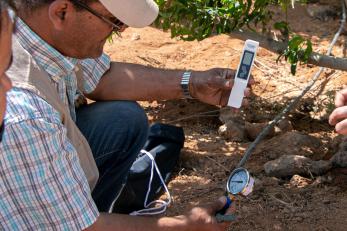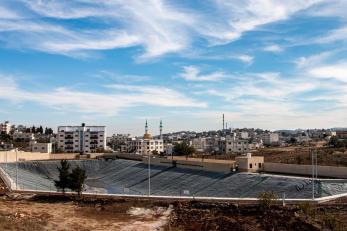Mercy Corps and USAID promote water conservation in Jordan

Jordan is one of the most water-scarce countries in the world. The country’s renewable water supply currently only meets about half of the population’s water demands, with groundwater being used twice as quickly as it can be recharged. A high rate of population growth and the influx of refugees from regional conflicts put additional strain on an already stressed water supply while changing rain patterns threaten to exacerbate the problem.
The agriculture sector consumes over 50% of the country’s precious water supply while contributing only 4% to the gross domestic product. Mercy Corps, through the USAID-funded Water Innovation Technologies Project (WIT), offers support services to scale up the use of water-saving technologies by farmers and households in order to conserve the country’s limited water resources. The WIT project is using a market system development approach and so seeks to achieve its goal of saving 18.5 million cubic meters (mcm) of water by addressing market system constraints in the adoption of innovative water-saving technologies and practices throughout agriculture and household sectors. In September 2021, the project celebrated the achievement of its main target by saving 19.765 mcm of water and exceeding most of its other indicators.

USAID WIT began in March 2017 and for the first two years developed assessments, surveys, and questionnaires that guided the different interventions implemented by the project. Through these tools, the project learned that there are many market constraints in both the agriculture and household and communities water sectors, including beneficiary access, ability to afford, and awareness of water-saving technologies. To address these constraints, the project dedicated its efforts during the past three years to the implementation of a wide variety of activities including an investment fund, community training programs, and technical training programs.
The project has educated 17,473 people through training and awareness sessions, 455 farmers by facilitating activities of agriculture engineers and key stakeholders with a results-based package to improve private sector advisory services, farmers awareness activities, and demonstration sites. Also, the project rehabilitated 11 communal water facilities and supported a revolving loans program that issued 936 loans for water-saving technology purchases in both household and agriculture sectors. Finally, the project implemented a variety of behavioral changes and communication interventions that reached 9,451,133 people in Jordan.
As a result of these plus several other awareness activities and communal projects, which helped to overcome the lack of farmer and household awareness of water-saving technologies and practices, more than 957 technologies and practices have been adopted by farmers, 17,000 Dunums (1,700 hectares) of farmland irrigation was optimized, and more than 24,016 households adopted water-saving technologies and/or practices after CBO awareness sessions led by WIT.
USAID WIT has shown that the Market System Development approach facilitates the adoption of water-saving technologies and it can bring some returns to farmers and households. The need for investment in water-saving technologies and practices is more important than ever with climate change threats. By promoting behavioral change among the public and policymakers, and partnering with the private sector, Mercy Corps and USAID are cultivating a renewed stewardship of shared water resources to ensure water remains available for the people of Jordan.